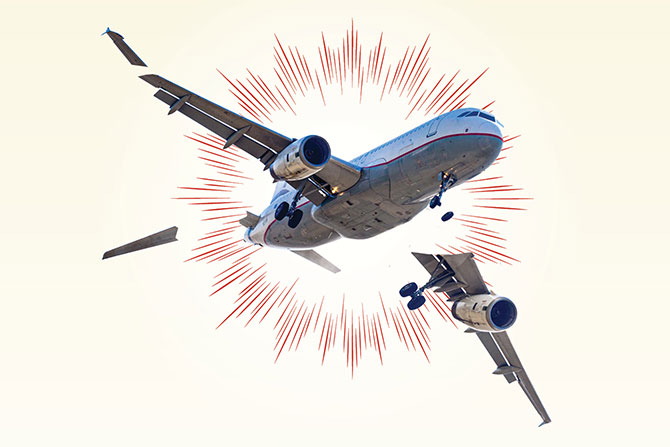We have clearly moved in a direction where profit is prioritized far above quality and safety in virtually every realm of society.
To begin, let’s do a quick thought exercise. Think about all of the services that you patronize — whether by choice or necessity — products that you purchase and industries you interact with on a yearly basis. It could be succinctly described as one’s consumer experience, even if we’re not always acting as consumers in every interaction. Off the top of your head, what are some of the industries or services that you patronize that you believe can least afford to cut corners and prioritize profit over quality control and safety? I’m sure a few come to mind — the quality of medical care, the structural soundness of your automobile, housing construction — where errors in quality control and safety can have devastating, even deadly, consequences.
To take the point further, what is one industry in which cutting corners and ignoring quality control seems particularly foolish, given the ultimate point of its existence? Airline travel, and specifically the construction of airplanes, would be right at the top of the list, given how crucial safety is to the industry. That is why recent developments around airplane-manufacturing giant Boeing have been so shocking and disconcerting. Over the last six or seven years, Boeing has been enveloped in scandal, but it has reached a cascading crescendo in recent months, with a litany of incredibly serious accusations against the company accompanying near-daily issues with its troubled 737 MAX airplanes. How did a storied American company like Boeing get to a place where it’s operating and cutting corners like a fly-by-night enterprise, and what does it say about the structure and incentives of the American economy?
Boeing’s most recent string of problems was set off on January 5, when an Alaska Airlines flight was forced to make an emergency landing back at Portland International Airport after a door panel fell off at 16,000 feet. The plane in question was a Boeing 737 MAX, and after further inspection, the cause was an absence of bolts on the door plug. Although passengers had to endure a terrifying experience, it is extremely fortunate for all involved that the incident wasn’t even more serious. The following day, the Federal Aviation Administration (FAA) ordered all Boeing 737 MAX 9 planes in U.S. territory to be temporarily grounded, But after announcing it would increase oversight on the 737 MAX 9, the FAA cleared the aircrafts to resume flights at the end of January.
Since then, the problems have been multiplying for Boeing to the point where it’s impossible to ignore for even the most casual news observers. Since the beginning of March, Boeing planes have veered off the runway, lost a tire, shot flames from the engine and taken an unexpected nosedive, injuring 50 people. The nosedive incident, caused by an undiagnosed “technical event” on a flight from Sydney, Australia, to Auckland, New Zealand, is the latest in a seemingly endless string of embarrassing and confidence-obliterating incidents for Boeing.
The most significant fallout from these incidents is the March 25 announcement that CEO Dave Calhoun will step down, effective the end of the year. However, it is clear that Boeing’s problems extend far beyond one individual, and instead point to a culture of total impunity and corrosive greed. After all, following two major crashes involving Boeing 737 MAX planes in 2018 and 2019, Boeing’s then-CEO Dennis Muilenberg was dismissed, but the company’s culture clearly remained exactly the same. Muilenberg received a massive $62 million compensation package, went off to his retirement home and the cycle repeated. With true enforcement by the FAA and any fear of true consequences, it is difficult to imagine Boeing’s modus operandi changing dramatically, outside of public relations measures.
To illustrate the extent of Boeing’s recent turmoil, a recent Politico article details how former Boeing Executive and Whistleblower Ed Pierson refuses to fly on a MAX plane, even going so far as to walk off a MAX plane. “Last year, I was flying from Seattle to New York, and I purposely scheduled myself on a non-MAX airplane. I went to the gate. I walked in, sat down and looked straight ahead, and lo and behold, there was a 737-8/737-9 (MAX) safety card,” said Pierson. “So I got up, and I walked off. The flight attendant didn’t want me to get off the plane. And I was not trying to cause a scene. I just wanted to get off the plane, and I just didn’t think it was safe. I said I purposely scheduled myself not to fly on a MAX.” You can’t find a more damning indictment than a former senior Boeing official refusing to fly on a MAX plane. However, the recent string of in-air mishaps is just the tip of the iceberg in Boeing’s recent controversies.
On March 9, John Barnett, a former Boeing quality control manager who became a whistleblower against the company, was found dead in Charleston, South Carolina, where he formerly worked at Boeing’s large 787 plant. Barnett was found deceased in a vehicle in a motel parking lot, where the coroner’s office says the cause of death “appears to be a self-inflicted gunshot wound.” However, since his death, there has been rampant speculation that Barnett didn’t take his own life. Even though Barnett could have completed his testimony the previous day, Boeing’s attorneys reportedly requested Barnett stay an additional night and complete his testimony the next day, March 9. Also, Barnett was set to come into a large financial settlement, and friends and family have said that Barnett told them, “If anything happens to me, it’s not suicide.” It’s a mountain of circumstantial evidence that points to some wildly amoral, damaging actions on behalf of Boeing. The rising tide of the Barnett scandal, combined with the constant issues with the 737 MAX, has placed Boeing at a genuine crisis point.
This recent string of embarrassing and damaging incidents is the latest flareup in what has been a brutal five-plus years for Boeing. A pair of major plane crashes involving MAX planes in late 2018 and early 2019 caused major reputational damage and a series of investigations against the company, but it appears that Boeing didn’t change course. In October 2018, a Lion Air MAX plane crashed in Indonesia, killing all 189 people on board, followed by an Ethiopian Airlines MAX crash in March 2019 that killed all 157 people on board. Numerous countries, including the United States, decided to ground the MAX following the second major crash. It’s a fairly obvious point, but if those two major crashes had occurred in the United States, American media would be endlessly discussing them. However, because they occurred in India and Ethiopia, relatively little attention was paid to them stateside. Certainly Boeing did not receive the kind of reputational damage in America that they are currently suffering.
In the months following the crash, Boeing posted its largest-ever quarterly loss, followed by a string of public relations moves designed to rehabilitate the company’s image. Boeing’s board of directors created a permanent safety committee to oversee its aircraft and then fired its CEO and top executive over the following months. After spending over a year redesigning the MAX, the U.S. FAA lifted the grounding order of the 737 MAX in November 2020. Then, in 2023, Boeing began delaying delivery of their 737 MAX 7 due to non-compliant fittings, followed by reports that their 737 MAX planes were having continual mishaps. Then, the Alaska Airlines incident happened in January, causing a spotlight to come back on the company and its practices. The Barnett death and subsequent speculation have only heightened the turmoil.
After digesting all of this recent controversy, one wonders, “How did Boeing get to this place? How did they go from being a once-unassailable company to one with its reputation in the toilet?” It’s a universally applicable shift from being focused primarily on the quality of the product to being primarily concerned with massive quarterly profits above all else. In the last decade, Boeing has spent more than $40 billion on stock buybacks and distributed almost $22 billion in dividends to shareholders. Experts point to the 1990s as the period when Boeing’s corporate culture shifted. “In the early 90s, Boeing was really an engineering company run by engineers,” said Bill Lazonick, an economics professor at the University of Massachusetts Lowell. However, things changed dramatically in 1997 when Boeing acquired a rival plane manufacturer, McDonnell Douglas, in what was the 10th-largest merger in American history at the time. According to Lazonick, McDonnell Douglas was “shifting their company to shareholder values” and Boeing followed suit. To show their commitment to this new philosophy, Boeing named former McDonnell Douglas head Harry Stonecipher as CEO. Stonecipher was once quoted as saying, “You can make a lot of money going out of business.” That is not a philosophy you want to see injected into a company that needs to have such a high priority on safety.
Stan Sorscher, a former Boeing engineer and union representative who worked there during the merger, said the company’s shift in strategy was obvious. He remembers a conversation with an executive who told him that the deal would redirect the company towards “cost-cutting and investor focus.” Pierson, mentioned earlier in the article, puts it more bluntly. “Why are we having all of these production quality defects?” he asked. “I think the simple answer is the company is continuing to rush production to get planes out the door.”
Through all of their turmoil beginning in 2018, Boeing’s executives and shareholders raked in huge dividends and stock benefits. It illustrates the perverse incentive system when everything is so closely wedded to the stock price and shareholder returns. We often see this in industries where the consequences are less dire than when an aircraft crashes, but Boeing is an extreme example of how the constant chasing of profit can easily corrode a company’s foundational purpose. We have clearly moved in a direction where profit is prioritized far above quality and safety in virtually every realm of society. The severity of the consequences of this mentality may vary, but it is a wildly inhumane, extreme way of orienting an economy. Boeing has made conscious decisions that should have them facing serious consequences. However, in a system that prioritizes profit so far above everything else, there is a real question if they will face legitimate consequences. That should make anyone with a conscience question if it’s remotely sustainable to have our priorities so far out-of-whack.









